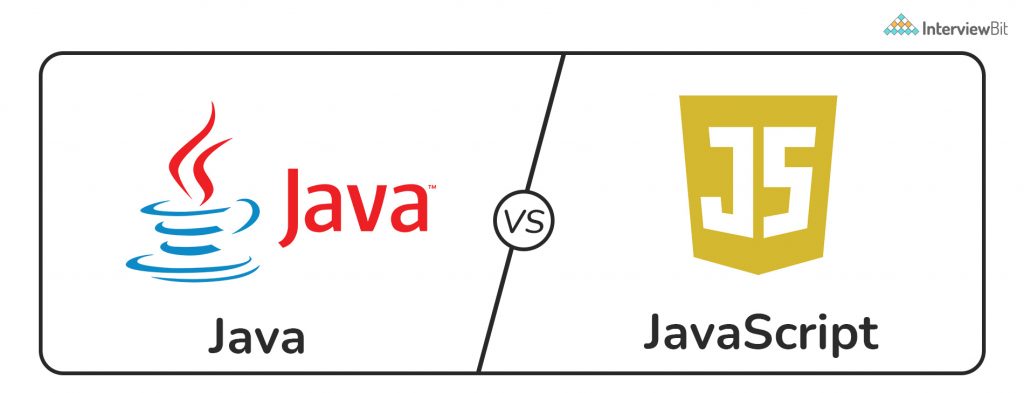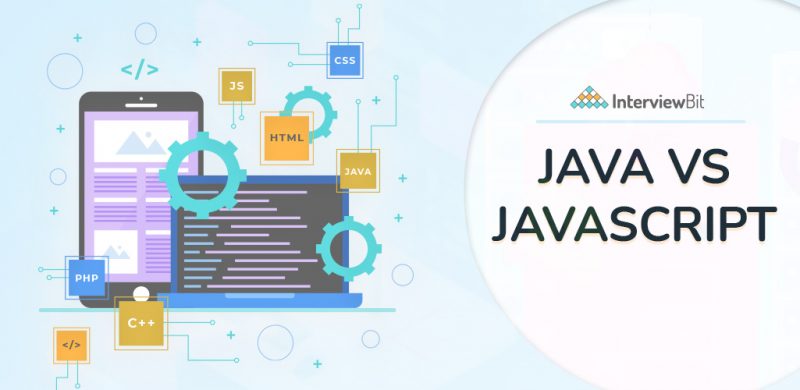- What is Java?
- What is JavaScript?
- Java vs JavaScript: Difference and Comparison
- Advantages of Java and JavaScript
- Disadvantages of Java and JavaScript
- Javascript vs Java: Which one is better?
- FAQs
- Q.1: Is JavaScript easier than Java?
- Q.2: Should I learn Java or JavaScript first?
- Q.3: How is JavaScript different from Java?
- Q.4: Can I learn JavaScript without knowing Java?
- Additional Resources
In the world of software development, there are two fundamental threads that bind the world of programming together: Java and JavaScript. Java and JavaScript have been around for a very long time and are still very popular today. Coders are bound to come across these terms even if they only take an occasional interest in the field. The Java programming language is used for making applications for devices or browsers, while JavaScript is used for creating HTML documents and browsers. The two can, however, be easily confused as well. There are some people out there who might think Java is just a more compact version of JavaScript, but this is not entirely accurate. Although there is some overlap between Java and JavaScript, both languages have significantly different functionality. The purpose of this article is to unravel what Java and JavaScript are as well as the difference between Java and JavaScript.
What is Java?
Java is a cross-platform, class-based, general-purpose programming language used to build different and complex applications like web applications, mobile applications, big data technologies, etc. It incorporates object-oriented programming concepts like inheritance, encapsulation, abstraction, etc., to make the language secure and reliable.
It is a computing platform that consolidates a compiler, execution engine, computer software, set of libraries, and so much more for developing, and running Java Applications and programs.
Confused about your next job?
Another important part of Java is JVM i.e., the Java Virtual Machine. JVM is a machine that allows Java to convert byte code into any machine code. Now, byte code is an intermediate code translated from the source code. This code, unlike the machine code, runs on the JVM to be interpreted by different machines Java applications run on like Linux, macOS, Windows, etc.
JVM ensures Java supports the feature of Write once Run Anywhere by giving adaptability for cross-platforms.
All these different platforms have distinct characteristics and features that help programmers build desktop, and mobile web applications. Some platforms are suitable for developing API’s for desktop applications or some work well for Graphic User-interface Development, one might be beneficial for its high performance.
The pivotal aim for the applications is to assist programmers in an easy, fast, and secure development and execution process.
Features of Java
- Easy and Simple to Understand: Java is known for its simplicity as it comes with a code that has a familiar base from languages like C and C++ but minus the complexities of those languages. Complexities like Storage classes, operator overloading, etc.
- Platform-Independent: Java is a platform-independent programming language. This means that Java code can run on any machine, any platform, any operating system. It is possible because of Java Virtual Machine and Byte Code. Byte code is an intermediate code, a converted code from the source code which runs on JVM. JVM is software that allows executing ByteCode on different platforms and Operating Systems.
- Object-Oriented: Java programming language supports all the object-oriented programming features and concepts like Encapsulation, Abstraction, Inheritance, etc. These OOP concepts provide many advantages to the language like security, preventing data redundancy, easy troubleshooting, and many more.
- Compiled and Interpreted: Many programming languages have either the advantage of compiling or interpreting the code.
Java, on the other hand, is a combination of both advantages. With Java, you can compile the source code into ByteCode and interpret it on JVM to make it executable on any machine or platform.
- Secure and Reliable: Java as a programming language include many tools, features, etc., that make it a secure and reliable language for programmers and developers. It provides secure communication, public key infrastructure, authentication, cryptography and so much more for providing a secure and reliable framework for the developers.
Read More About: Features of Java
What is JavaScript?
JavaScript is a scripting language(programming language that is interpreted during run time into the machine code) used for client-side development to add functionality to static web pages and applications for providing an interactive user experience.
The JavaScript language allows dynamic features to be added to web pages and applications, such as:
- Interactive Forms
- Auto Updates
- Autocomplete text suggestions
- Animation graphics
- Slideshows
and so much more.
Javascript gives life and action to dull and static pages. It becomes one of the fundamental front-end languages including HTML (HyperText Markup Language, used for creating the layout of the web page) and CSS(Cascading Style Sheets, used to give style to the HTML layout like color, background, font, etc. )
JavaScript, however, now with a recent introduction to Node.JavaScript (a platform for running JavaScript codes outside the browser) programmers can use it for server-side or backend development as well. It enhances the usability of the language and highlights its versatility.
JavaScript can be, therefore, used for
- Adding interactive, functional elements to web pages
- Developing web-based games
- Creating Mobile Applications
- Back-end or server-side development
Features of JavaScript
- Front-end Scripting Language: JavaScript is a front-end language that doesn’t require extensive functions to run on the browser. It, unlike the server languages like PHP,ASP.NET, etc., does not need the assistance of the server to perform simple tasks. This saves a lot of time in performing repetitive tasks.
- Lightweight: JavaScript is a lightweight scripting language. It means that with minimalistic features and characteristics, it is easy to implement, runs without extra calculations on the browser and prevents excessive load on the RAM and processor (small memory footprint).
- Prototype-Based Language: JavaScript is a prototype-based language which means that JavaScript uses prototypes of the objects to create more objects. Unlike Java, wherein classes are defined and, then objects are created.
- Default Parameters: Default Parameter is a feature that allows JavaScript to secure a programmer’s code from failing because of a single or simple mistake. It is a default argument on a function that does not need to be defined but protects the code from simple errors.
- User’s Input: JavaScript in terms of error-checking takes into the input of users as well. This can be explained by supposing while filling a form a user leaves a field empty or put incorrect information, the code will not run. The validation for the user’s input saves a lot of time during checking and debugging the errors.
Read More About: JavaScript Features
Java vs JavaScript: Difference and Comparison
The primary difference between Java and JavaScript, is that Java is an OOP programming language, whereas JavaScript is an OOP programming script. JavaScript code is entirely written in text and only needs to be translated. Contrarily, Java needs to be compiled.
From the table below, you can learn more about the differences between Java and JavaScript.

| Parameter | Java | JavaScript |
| Developed By | Java is an Object-Oriented language developed by James Gosling from Sun Microsystems | Javascript, originally called LiveScript, was developed by NetScape. |
| Working | Java is a standalone programming language that is executed on JVM (Java Virtual Machine) by converting the source code into the byte code. | JavaScript is a scripting language that needs to be placed inside the HTML document and executed or run on the web browsers like Chrome, Firefox, etc. |
| Language Type | Java is a class-based object oriented programming language. | JavaScript is a prototype-based scripting language. |
| Object Type | Java as a class-based language creates objects after defining a class. | JavaScript objects are prototype-based that creates objects based on a single prototype object. |
| Variable Declaration | Java supports static typing which requires variable and type declaration before the compilation and execution. | JavaScript supports dynamic typing where the type and the variable can be defined anytime in the program. For example, you do not have to define variable ‘c’ type (integer, float, etc) during compile type. You could do that even during the run-time as well. |
| Concurrency (the function of handling different instructions at the same time) | Java supports and ensures concurrency using multi-threading that makes the program faster and efficient. | JavaScript does not support concurrency or multiple events at the same time. |
| Compilation and Interpretation | Java is compiled as well as interpreted. It is compiled into a byte code and interpreted on a JVM. | JavaScript is interpreted only on the web browser directly. |
| Source Code Visibility | In Java, the source code is hidden, in the form of byte code that cannot be read by unauthorized or third party users. | Javascript as a scripting language runs code on a browser which is visible in plain text to everyone. |
| Requirements | To develop and run a Java Program, you need the entire Java Development Kit (JDK). | JavaScript only requires a text editor to write the code. |
| Syntax | Data types in Java need to be declared. | Data Types in JavaScript do not need to be declared. |
| Security | Java is created keeping in mind the primary motive of keeping the source code secured. And it provides robust features to support that. | JavaScript’s source code is not essentially secure with plain text visibility to everyone. Programmers need to add functions for tight security. |
| File Extension | Java supports the file extension “.Java” | JavaScript supports the file extension “.JavaScript” |
| Suitability | Java can be used for several types of application development including: • Mobile application development • Cloud-based Applications • Big Data Technologies • Web-Based Applications IoT Applications | JavaScript is primarily used for front-side development but with the latest updates and introduction of Node.JavaScript could be used for building web and server applications, game development, web and mobile application development. |
| Key Features | • Extensive Libraries • Simple and Easy to Learn • Popular | • Lightweight • Powerful frameworks • Great for front-end development |
| Companies Using | Netflix, Google, Airbnb, etc. | Paypal, Uber, Microsoft, etc. |
Before coming to the final solution of which is better in Javascript vs Java, you should have a clear understanding of the benefits and drawbacks of both languages, Java and JavaScript.
Advantages of Java and JavaScript
Advantages of Java
- WORA (Write Once Run Anywhere) – Java’ portability features of compilation and interpretation make it compatible to write once and can run anywhere. You just need to write the source code that will be converted to a Byte code on JVM for interpretation on any machine or OS.
- Robust and Secure – Java’s features make it one of the secured platforms for developing and running applications. For example, it does not support explicit pointers (a function of providing memory addresses to different values) or robust security measures while defining classes, etc., to minimize unauthorized access and cyberattacks.
- Automatic Garbage Collection – Java, with the feature of automated garbage collection, does not let unused, idle objects take up unnecessary space. It cleans up automatically objects that are nowhere to be used in programs.
- Multi-Threading – Java ensures multi-threading. It means that Java supports the performance of simultaneous tasks. Thread here is a unit of a process and Java can run multiple threads at the same time.
Advantages of JavaScript
- Frameworks – JavaScript has one of the powerful frameworks. The framework is a set of collections of codes that are used by programmers while creating an application. Powerful frameworks add different features and functional elements for the websites and applications.
- Browser-Control – JavaScript is primarily used for client-side development and runs on the browser. It gives more control to the browser ensuring lesser load on the server, increasing efficiency of writing, implementing the code, using it for validation and user inputs.
- Speed – JavaScript ensures a rapid development process due to its execution directly on the browser. It minimises support from the server for even the basic and simple calculations that increase efficiency and save time.
Disadvantages of Java and JavaScript
Disadvantages of Java
- Performance – Java is not as rapid as its native or peers languages like C++ and C. It significantly gives a slow performance because of the additional tasks of compilation and interpretation. Java also has high memory consumption that put a heavy load on the CPU and slows down the efficiency of the language.
- Memory Management – Auto Garbage Collection is both a benefit and drawback for Java. Yes, it surely automatically collects unnecessary and unused objects. However, it puts a heavy load on the processor and in addition, put a hold on the working of all the other threads as well. It increases the time to complete tasks.
- Backup – Another significant drawback of Java is its lack of ability to back up data. There are robust features for storing and collecting data but not as such a strong facility that backs up data.
- Look and Feel – Java provides several frameworks and GUI builders for developing the user interface for applications and web pages. But, they are not suitable for building high-scaled, complex user interfaces. Frameworks like JavaFX, Swing, etc., do not provide much complexity and functionality for front-side development.
Disadvantages of JavaScript
- Front-end security – As JavaScript is a client-side scripting language, the code runs on the browser. It increases the chances of the source code visible and accessible to third parties and unauthorized users. This hinders the integrity and security of the code.
- Browser Support – JavaScript since, with its standardized version, can be run on any browser and platform. However, it also becomes a drawback for the scripting language because of its inconsistencies. Sometimes running the same code on different browsers like Safari and Mozilla Firefox can bring different outputs and functionalities. It hampers the quality and speed of the language.
- Time Consumption – JavaScript is all about varied and complex functionalities. This can take up a lot of time in converting those functions to machine-understandable code. It not only questions the performance of the language but also reduces the website speed as well. It can deviate the user from using the site altogether.
Javascript vs Java: Which one is better?
The question of the article is here. After a thorough reading of the article, it is evident to say that no one language is superior to another.
Javascript shines through as a front-end scripting language that has powerful frameworks for creating interactive GUI than Java.
Java, on the other hand, is a standalone language that is fast, secure, and reliable for server-side development. Programmers use it for its extensive and rich libraries, efficiency and robust security features for creating mobile applications, desktop applications, gaming and web-based applications, and so much more.
So, in the end, it is up to the programmer or developer to decide which is best for their project. If you are wondering which language you should choose, it depends on what kind of project you are working on, what is required, and what your project demands will be.
FAQs
Q.1: Is JavaScript easier than Java?
Ans: Yes, JavaScript is easier than Java as it requires fewer tools and prior knowledge of development kits. You need just a text editor, and programming knowledge to start writing the code for web development.
Q.2: Should I learn Java or JavaScript first?
Ans: Learning Java first is usually preferred but JavaScript is more easy to learn. Therefore, it is up to you ultimately what you want to learn first.
Q.3: How is JavaScript different from Java?
Ans: There are many differences between Java and JavaScript but the key difference is that JavaScript is a scripting language that runs on browsers to add functionality to static pages. Java, whereas, is a server-side language that needs to be compiled into bytecode and executed on JVM for creating and running applications and programs.
Q.4: Can I learn JavaScript without knowing Java?
Ans: Yes, you can learn JavaScript without knowing Java as there is no connection between the two. Both are different types of languages. javascript is used mainly for front-end development like using for web-based applications or GUI desktop applications.
Java is used for server-side or backend development for desktop, mobile, and web-based, gaming applications.
Additional Resources
- Java Interview Questions
- Javascript Interview Questions
- Online Java Compiler
- Online Javascript Compiler
- Java Developer
- Java Developer Salary
- Java Developer Resume
- Java Developer Skills
- Characteristics of Java
- Java Books
- JavaScript Books
- JavaScript Applications
- Top JavaScript Libraries
- JavaScript IDE
- JavaScript Frameworks
- Difference Between HTML and JavaScript
- Javascript vs JQuery
- Javascript Vs Python
- Typescript vs Javascript
- Difference Between C and Java
- Java vs Python




